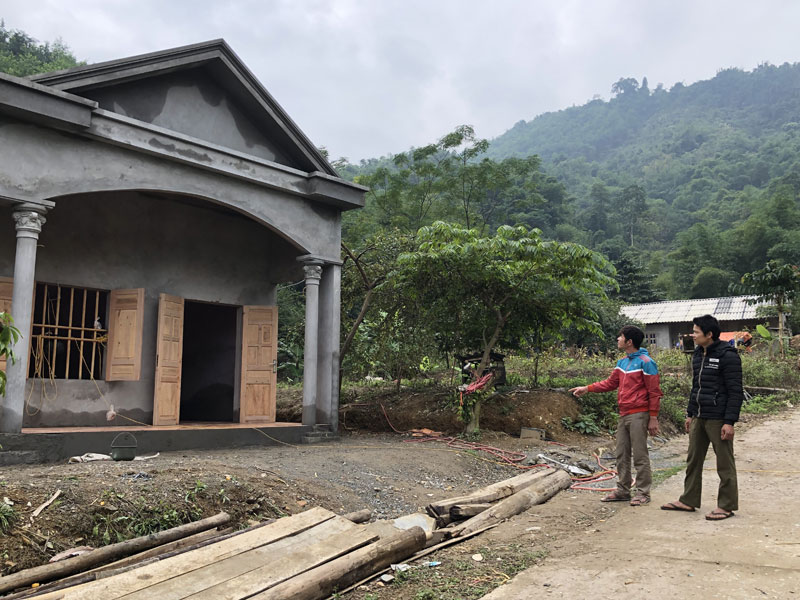
(HBO) – More than six years after moving to their new place, nearly 40 households in the resettlement area of Suoi Ke - Doi Ke in Mit villafe, Tu Ly commune of Da Bac district have gradually settled down.

Ly Van Huan's family in Mit village, Tu Ly
commune of Da Bac district has gradually settled down after more than six years
of living in Suoi Ke resettlement area.
"In the past, when I was living in Nhom
village, Dong Ruong commune, my family’s life was extremely precarious, because
it was an area at risk of landslides and flash floods in the rainy season. In
2012, with the encouragement and support of the Party and State as well as
local authorities and people, we moved to settle in the new area. Since then,
our material and spiritual lives have been getting better and better. Without
having to worry about flooding destroying our crops and house, we feel relieved
and motivated to develop production and take care of our family,” said Ly Van
Huan.
Huan’s family is one of the many households
that have increased their income in the resettlement areas. Dinh Ngoc Thai's
family with the income of over 24 million VND per year, and the family of Quach
Cong Thuan with over 60 million VND per year from pig breeding are other
examples. Since their moving in the new place, the new-comers’ life has
improved day by day. The entire residential area has been under planning, and
the main road leading to the commune concreted. Locals have accessed to clean
water, telecommunication service, and improved infrastructure works.
Ly Van Huong, head of Mit village in Tu Ly
commune said that the new residence is spacious but lacks production land.
Meanwhile, during the process of moving to the settlement area, the
compensation has yet to be completed, therefore, many households suffer a
shortage of capital to develop their production. However, locals in Doi Ke have
strived persistently to overcome difficulties. With the attention and support
of the province and local authorities, they have work hard to improve their
incomes. Some household have focused on animal husbandry and farming, while
others have developed carpentry or joined locally-based companies and
enterprises. Compared to the time they start residing in the locality, their average
per capita income have increased from 9 million VND per year to over 19 million
VND curretly./.
More than just an information technology teacher, Bui Van Nien is an inspiring figure who has nurtured the scientific curiosity and creative spirit of students in Vietnam’s ethnic minority communities.
Da Bac is the most disadvantaged mountainous district in Hoa Binh province, with ethnic minorities accounting for about 90% of its population. Over the past years, the district has mobilised resources to implement ethnic policies to improve the quality of life of local people.
In recent years, Hoa Binh province has consistently prioritised the protection, care, and education of children, particularly those from ethnic minorities and disadvantaged backgrounds, by creating a safe, healthy, and nurturing environment for their all-round development.
The Steering Committee for Tobacco Harm Prevention and Control of Hoa Binh province, in coordination with the Tobacco Harm Prevention and Control Fund, held a ceremony on May 28 in response to the World No Tobacco Day (May 31) and the National No Tobacco Week (from May 25 to 31). The event was chaired by Nguyen Van Toan, Standing Vice Chairman of the provincial People’s Committee and head of the Steering Committee.
Since 2021, the Center for Industrial Promotion and Industrial Development Consulting (CIIDC) under the Department of Industry and Trade has been implementing a school lighting model as part of the plan for using energy efficiently and economically in Hoa Binh Province in the pẻiod of 2021 - 2025. This model not only aims to improve the learning conditions and enhance the education quality, but it also promotes the message of energy saving, energy security, environmental protection and contributes to the goals of socio-economic development.
In the 2024 - 2025 school year, the entire Hoa Binh provincial education sector includes 520 educational institutions and schools. Among them are 13 ethnic boarding schools with 153 classes and 4,487 students. Four of these schools have met national standards, reaching 30.7 percent.



